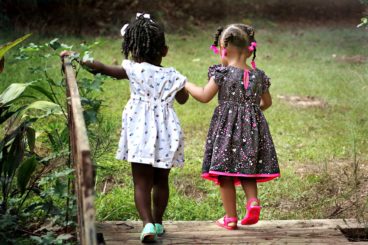
The day before my daughter started kindergarten we drove as a family to a silent school, where nearly one thousand students would enter the next day. We walked around the playgrounds and the bus loading zones as we prayed for the students that would spend much of the next year of their lives there. We prayed with our kids for the teachers and staff, for their future friends, and for those they might clash with as well.
That year I developed a nighttime routine with my daughter. I would curl up in bed with her and ask her about her day, the best and worst parts of it. It was in these dark and quiet moments that she would ask me the questions burning in her heart—why her friend’s dad was in jail, or why another friend’s parents didn’t live together anymore. She asked questions about foster care, divorce, and the friend that had two moms. We would talk together about these issues her five-year old mind was trying to grasp, and pray for the peace of her hurting friends.
We’ve always wanted our children to be involved in a diverse community, not living in a protected bubble of people just like them. My husband and I made a commitment after living in the Middle East that we would help our future children see a wider world beyond our suburban home. We now have two little ones who join us in refugee ministry, and are used to experiencing other cultures.
But when our daughter entered school we felt unprepared to help her navigate the complexity of issues she found in her own culture. We realized just how real the hurts are that our children see every day in their schools, clubs, and neighborhoods.
But when our daughter entered school we felt unprepared to help her navigate the complexity of issues she found in her own culture. We realized just how real the hurts are that our children see every day in their schools, clubs, and neighborhoods.
I know as our children grow the questions will only get harder, the situations more intense. So, I have started asking friends who have walked these roads before how they do it. How do they point their kids back to Christ when the world around them doesn’t make sense, how do they teach their children to love in a divisive culture?
Author and activist Beth Bruno (author of A Voice Becoming: Rites of Passage for Raising Strong Daughters, coming in 2018 from FaithWords) shared with me how an issue at school opened the door to a hard conversation about loving others “even when we don’t understand or maybe don’t even agree with what they are doing or what they believe.”
Playground gossip about the new girl at school, Iris, brought about the realization that Iris used to be Isaac, a boy in her eight-year-old daughter’s class who had transitioned to a girl over the summer. Beth took her daughter to the park and they talked about God and being made in his image, about our fallenness and about love. She says they reached “no big conclusion about gender identity or sexual orientation that day,” but she knows that their discussions then and since have made an impact. Her daughter’s attitude five years later as she lovingly accepts one of her best friends who is bisexual, is evidence of that impact.
Beth encourages us to take issues as they come with our children, and says “our job as parents is to help metabolize the realities of life and digest it in bite-sized chunks that are age appropriate and God-ward.”
It’s so easy to divide life into segments—the secular and the sacred, to relegate ministry to volunteer opportunities and see school or work as something altogether separate. Yet, my husband and I wanted our kids to know from an early age that serving others isn’t something we do but something we live. We want our kids to shine the light of Christ’s love in every corner of their lives.
My husband and I wanted our kids to know from an early age that serving others isn’t something we do but something we live.
Shelly Wildman encourages intentional parenting at sites like Mothers of Daughters and (In)courage, and has much to share from parenting three grown children who have had “plenty of opportunities to share their faith through love and kindness.”
She says her extroverted oldest daughter, Kate, encouraged her to see that “Christ didn’t have friend boundaries” when she befriended everyone at school including Rosie, a promiscuous drug user who had been kicked out of school several times. Kate was simply kind to Rosie. “She took time to talk to her. She invited Rosie to play on her team. I’m sure she looked her in the eye,” says Shelly.
One day Rosie commented to Kate, “I like you, and I don’t like anybody. Why are you so nice to me?” Rosie ended up getting kicked out of school again and landed in jail, but Shelly says experiencing practical kindness through Kate has to have made a difference. She says, “Sometimes it just takes a little time, a little love, and a little looking into someone’s eyes to share the love of Christ.”
Engaging the world around us with love is a messy task. I’m just beginning to learn how, as parents, it means hard conversations, lots of prayer, and guidance from those who have gone before us. We are called to love the hurting, and so are our children. 1 John 3.18 encourages us as dear children to “not merely say that we love each other” but to “show the truth by our actions.”
When the news spills over into our living room and my five-year-old son asks to understand why the police killed another black man today and my now seven-year-old daughter weeps at the election results and asks how our President-elect could speak such hateful words, I pray with them, and then together we act.
Let’s seek to listen to our children so they understand how to listen to others. Let’s seek to be a safe place for their questions, so they know how to be a safe place for others. Let’s seek to model Christ’s love in action so they can love wherever they go, whatever needs they encounter.
Nicole T. Walters is writer whose work has appeared at CT Women, Relevant, Ready Publication, and the forthcoming CruPress book Dating During the Apocalypse, And Other Conversations on God, Sex, and Life. She is an editor at SheLoves Magazine and Mudroom Blog, a member of the Redbud Writers Guild, and writes about faith, culture, and finding God’s voice in all the noise at Nicoletwalters.com.


